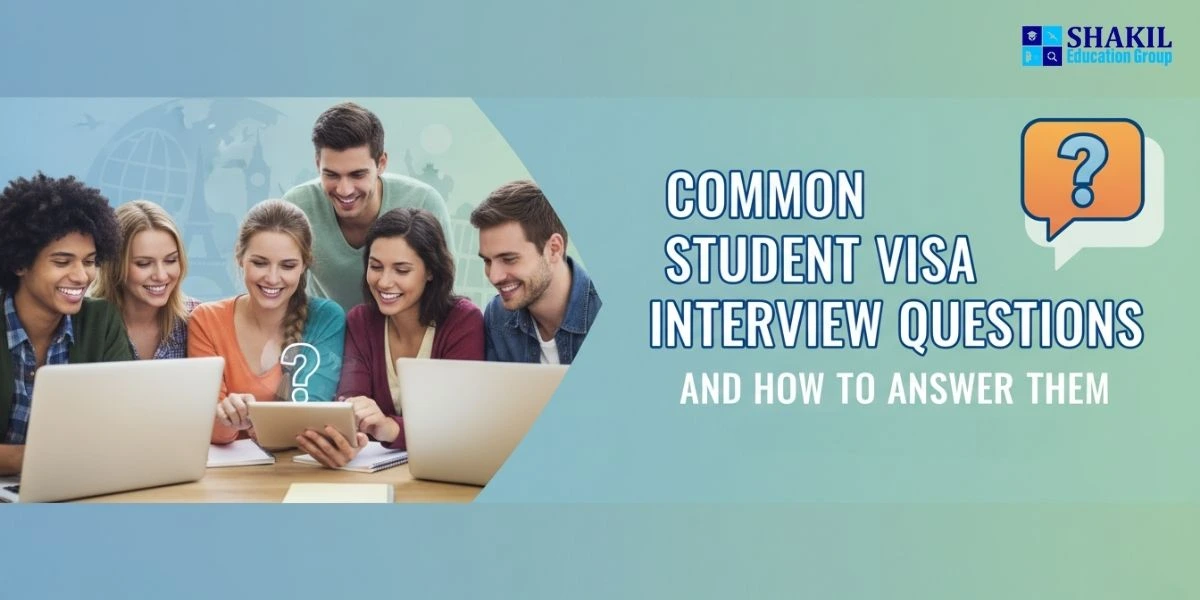Below, I've grouped typical questions. For each, you’ll find what the officer is trying to assess, a sample answer template, and tips and cautions. Adjust them to your own background.
1. Why do you want to study in [Destination Country]?
What they assess: your reason for choosing the country — not just the institution.
Sample answer:
“I chose Australia because it is known for world-class education, cutting-edge research in my field (computer science), and a multicultural environment. The universities there integrate practical training and industry partnerships, which suits my goal of working in software development post-graduation in Bangladesh.”
Tips/cautions:
- Avoid “because it’s developed,” “everyone goes there.”
- Focus on education system features, quality, specialization, research focus.
- Link back to your home country benefits.
2. Why not study in your home country?
What they assess: whether you're escaping something or genuinely choosing abroad.
Sample answer:
“While the universities in Bangladesh are improving, the specific specialization in Artificial Intelligence & Robotics, with advanced lab infrastructure and faculty research, is not yet offered locally at the same depth. By studying abroad, I gain access to better resources, global networks, and up-to-date curriculum, which I can bring back to contribute to my local industry.”
Tips:
- Be respectful of your home country institutions — don’t disparage them.
- Focus on gap in offerings, resources, or exposure.
3. Why did you choose this university/institution?
What they assess: your research, sincerity, fit.
Sample answer:
“I selected University of XYZ because of its strong research in renewable energy engineering, with specialized labs like the Solar Power Lab led by Professor ABC. I also appreciated the opportunity for student internships with partnering firms. The curriculum aligns closely with my undergraduate coursework and my long-term goal to work on sustainable energy solutions in Bangladesh.”
Tips/cautions:
- Be specific: faculty names, research centers, labs, industry tie-ups.
- Avoid vague statements like “good reputation” without backing them.
- Do not lie about superficial reasons (e.g. “I like the city”) unless genuine.
4. How many universities did you apply to?
What they assess: planning, seriousness, backup. Also cross-check with your application docs.
Sample answer:
“I applied to five universities in total; I received offers from three (XYZ, ABC, DEF). I ultimately chose University of XYZ because its infrastructure, faculty research, and financial package suited me best.”
Tips:
- Be honest. If you applied fewer, say so.
- Avoid making it sound like “just one option” — that may look risky.
- Don’t give names you didn’t apply to (officers may cross-check).
5. What is your intended major / program of study?
What they assess: clarity, alignment with past education, commitment.
Sample answer:
“I intend to pursue an MSc in Environmental Engineering. My undergraduate degree was in Civil Engineering, where I developed interest in sustainable water management. This master’s will allow me to specialize in water treatment technology and contribute to environmental projects in Bangladesh afterward.”
Tips:
- Link to your academic background or interest.
- If changing field, be prepared to explain why and how you’ll adapt (see question #20).
- Be precise about the program name.
6. Do you have prior experience or background in this field?
What they assess: preparedness, relevance.
Sample answer:
“Yes. During my undergraduate studies, I completed a senior thesis on wastewater treatment, interned at XYZ firm where I assisted the environmental team, and took elective courses in environmental chemistry and hydraulics. These have given me foundational knowledge and reinforced my commitment to the field.”
Tips:
- If you lack direct experience, highlight transferable skills (e.g. research, programming, lab work).
- Be truthful — don’t invent experience.
7. What are your test scores / academic record?
What they assess: scholastic ability and readiness.
Sample answer:
“I scored IELTS overall 7.5 (Listening 8.0, Reading 7.0, Writing 7.0, Speaking 7.5). My undergraduate CGPA is 3.75 / 4.0 (or 83%) in a rigorous program. I also obtained scholarships for academic merit in Year 3 and 4.”
Tips:
- Be ready to show scorecards, transcripts.
- Don’t exaggerate — if officer asks follow-up, you need to match documents.
8. How will you finance your studies?
What they assess: credibility of your financial plan.
Sample answer:
“My education will be financed through a combination of funds from my parents, a fixed deposit under my name, and partial scholarship awarded by the university. The total covers first year’s tuition, living, and contingencies. I have documents to support each source.”
Tips:
- Break down the cost: tuition + living + travel + insurance.
- Show multiple credible sources if possible (savings + sponsor + scholarships).
- Don’t mention reliance on unauthorized work.
9. Who is sponsoring you?
What they assess: authenticity, relationship, sponsor capacity.
Sample answer:
“My sponsor is my father, Mr. ABC, who is a businessman / engineer / Government officer in Bangladesh. He has prepared all the necessary documentation, bank statements, tax returns, and can support my education fully.”
Tips:
- Ensure sponsor name matches documents.
- Be ready to speak about their role, business, income.
10. What is your sponsor’s occupation/income?
What they assess: financial strength, stability.
Sample answer:
“My father is a civil engineer with 20 years of experience running his own consultancy firm. His annual income, as shown in tax returns, is equivalent to BDT X. He has savings, investment accounts, and property assets which help support my education.”
Tips:
- Memorize basic numbers (income, years, business nature) so you can answer smoothly.
- Be consistent with documents.
11. Do you plan to work while studying?
What they assess: whether your main intent is study or earning.
Sample answer:
“My primary goal is to focus on my studies. If permitted, I may take on part-time on-campus work (≤ 20 hrs/week) to assist with incidental expenses, but I will not depend on it. The core of my plan is academic success.”
Tips:
- Only bring up work if legally permissible in that country.
- Emphasize study as priority.
12. Do you have relatives or friends in [Destination Country]?
What they assess: social ties that might affect your plans.
Sample answer:
“I have a cousin living in Sydney, but I will be enrolled in Brisbane and will live on campus / privately. My course, plans, and finances are independent, and I do not intend to stay with or depend on relatives.”
Tips:
- Be honest.
- Explain how your plans remain independent.
13. What will you do after graduation?
What they assess: genuine intent to return, career vision.
Sample answer:
“After graduation, I intend to return to Bangladesh and join environmental consultancies or NGOs working on water sustainability. With advanced knowledge and international exposure, I aim to initiate my own firm or lead projects. I also have family responsibilities and opportunities awaiting me back home.”
Tips:
- Emphasize concrete plans back home (job title, company, contributions).
- Avoid implying desire to immigrate permanently (unless allowed and disclosed).
14. Why should we give you this visa?
What they assess: your overall pitch — alignment, clarity, trust.
Sample answer:
“I believe I deserve this visa because I have a strong academic record, a clear study plan aligned with my career goal, full financial backing, and deep commitment to returning to Bangladesh to contribute. I am serious, prepared, and driven to make this educational journey successful.”
Tips:
- Summarize your strengths (academic, financial, intention).
- Avoid arrogance — be confident, humble, and truthful.
15. What will you do if the visa is rejected?
What they assess: resilience, sincerity, future preparation.
Sample answer:
“If my visa is rejected, I would respectfully request feedback, address any concerns raised (improve my documentation, clarify plans) and reapply. My goal is genuine: to learn internationally and return. If needed, I may reapply next semester or strengthen certain areas.”
Tips:
- Don’t threaten or sound desperate.
- Show you’ll handle it constructively and move forward.
16. Can you tell me about your home country and ties there?
What they assess: your attachment and reasons to return.
Sample answer:
“Bangladesh is my home — my family, extended network, property, culture, and future lie there. My parents and siblings depend on me, and I have responsibilities. Professionally, I already have contacts in industry, and returning after studies will allow me to contribute with new skills.”
Tips:
- Be specific: property, family, job prospects.
- Avoid vague “I miss my home” — emphasize tangible ties.
17. Where will you stay / what city will you live in?
What they assess: logistical planning and authenticity.
Sample answer:
“I will be living in Melbourne, close to campus, in a university dormitory / private apartment. I’ve researched housing costs, public transport, and local amenities. I plan to be proactive in settling in.”
Tips:
- Show you’ve researched your destination city (cost, commute).
- Don’t appear ignorant.
18. What do you know about the city / country you’re relocating to?
What they assess: genuine interest, readiness.
Sample answer:
“Toronto is a diverse, multicultural city, known for its educational institutions, high living standards, and safety. It has efficient public transport, vibrant student life, and proximity to innovation hubs. I’m excited to engage in its cultural and academic ecosystem.”
Tips:
- Mention some facts (transport, diversity, climate, student community).
- Don’t exaggerate — stick to what you’ve researched.
19. How will you adapt to life abroad / overcome challenges?
What they assess: maturity, resilience, adaptability.
Sample answer:
“I understand studying abroad brings challenges — homesickness, cultural differences, language, academics. To adapt, I plan to join student groups, attend orientation, manage time well, ask for help when needed, and stay connected with family while immersing myself in local culture.”
Tips:
- Mention concrete strategies (clubs, counseling, networks).
- Avoid sounding idealistic — show realism.
20. (If changing field) Why change your field / major?
What they assess: sincerity and rationale.
Sample answer:
“Although my undergraduate degree is in Physics, I developed increasing interest in Data Science through electives and online courses. I believe combining physics thinking and data analysis will position me uniquely. I’ve already taken a few relevant courses (e.g. Python, statistics) and feel ready to transition.”
Tips:
- Show preparatory steps you’ve already taken (certificates, online courses).
- Be ready for a deeper follow-up.
21. How many years will the program take?
What they assess: consistency with your admission letter / documents.
Sample answer:
“My master’s program is 2 years (or 1.5 / 1 year if MS/MBA format). I plan to complete it within the scheduled timeframe, not extend unnecessarily.”
Tips:
- Ensure this matches your university offer.
- Don’t hedge too much — be confident about timeline.
22. Any backup plan if things don’t go according to plan?
What they assess: risk management, realism.
Sample answer:
“Yes, I understand uncertainties exist (visa issues, academic challenges). My backup plan is to strengthen documentation, consider alternative universities, or begin with diploma / certificate courses and then transition into degree. But my primary focus remains to follow through with the current plan.”
Tips:
- Don’t sound like you don’t care.
- Show that your first plan is solid, backups are just fallback.


